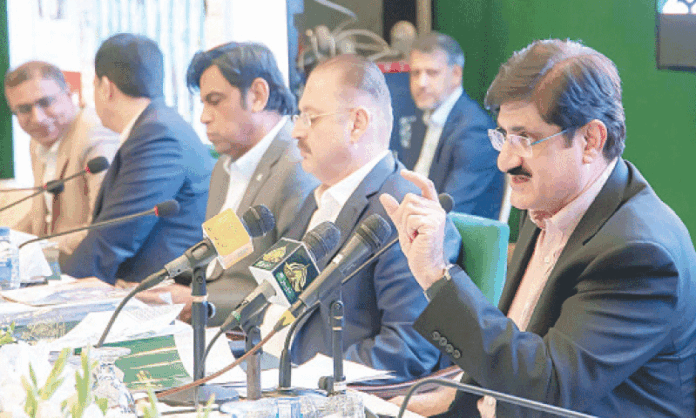KARACHI: Sindh Chief Minister Syed Murad Ali Shah said on Saturday that the provincial government has not introduced any new taxes in the budget for fiscal year 2025–26 and has eliminated or reduced several existing ones.
Speaking at a post-budget press conference at the CM House in Karachi, he said that export processing zones and special economic zones are now exempt from services tax. The entertainment tax has been abolished, and restaurant taxes have been reduced.
According to the Sindh Finance Bill 2025–26, the stamp duty on third-party vehicle insurance has been reduced to Rs50, and the insurance tax has been lowered from 15 percent to 5 percent. A list of tax-exempted items will be published in line with International Monetary Fund requirements.
The services of parliamentarians, local government representatives, judges, and tribunal members have been exempted from sales tax.
Tax exemptions also apply to the construction of houses up to 10,000 square feet in private residential schemes, and there will be no tax on health and life insurance policies up to Rs500,000. Government-approved universities and colleges will not pay tax on educational research. Hajj and Umrah travel operators will also be tax-exempt.
A 19.5 percent tax will be applied to vehicle trackers, security cameras, and alarm systems under the security services category. Internet, telephone services, Wi-Fi, and broadband connections will also be taxed at 19.5 percent. A 3 percent tax will be charged on vehicle transactions.
Online payments made to restaurants, hotels, farmhouses, and beverage providers will be taxed at 8 percent. Cab services will be taxed at 5 percent, while rental car services and freight vehicles will be taxed at 8 percent.
A similar 8 percent tax will apply to hiring armed guards and security guards, and real estate services. Foreign exchange services will be taxed at 3 percent.
Coaching and training centers will face a 3 percent tax. Private schools and colleges charging an annual fee of Rs500,000 or more will also be taxed at 3 percent.
Murad Ali Shah also announced a total provincial budget of Rs3.45 trillion, including Rs1 trillion for development and Rs2.15 trillion for current expenditures. Of this, Rs1.1 trillion is allocated for salaries and pensions.
Salary increases of 12 percent for lower-grade employees and 10 percent for higher grades have been approved. Education funding has increased by 18 percent, and the health sector budget has been raised by 11 percent.
Funding for agriculture, irrigation, and local government projects has also been increased.
The chief minister said that 20,000 to 25,000 job vacancies exist in Grades 1 to 4 and that recruitment for BPS-5 to 7 will be conducted through IBA-administered tests, with higher-grade positions also being filled. He said Rs590 billion has been allocated for development projects this year.
Murad Ali Shah criticized the federal government for withholding Rs105 billion in expected funds, saying Sindh was informed just a day before the budget presentation. He stated that while Sindh has received Rs1,478.5 billion from the divisible pool since last year, Rs422.3 billion remains outstanding.
He expressed hope that the federal government would release the withheld funds by the end of June.
The chief minister said major projects were excluded from the Federal Public Sector Development Programme and expressed concern over the halving of federal funding for the Sukkur-Hyderabad Motorway from Rs30 billion to Rs15 billion. He also opposed the 18 percent tax on solar panels and warned that the Pakistan Peoples Party would not support the federal budget if the issue is not addressed.
He said the Sindh government has allocated Rs25 billion for solar energy projects and has launched afforestation programmes to address climate change, though he acknowledged more work is needed. He admitted that digitisation of land records is still incomplete but said pilot projects are underway in Matli and Sukkur.
He said the delay in operating 150 buses in Karachi is due to resource constraints but mentioned that infrastructure and sanitation projects are ongoing across the province.




